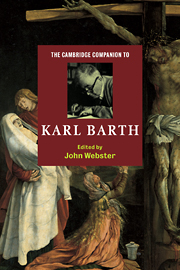Book contents
- Frontmatter
- 1 Introducing Barth
- 2 Theology
- 3 Revelation
- 4 The Bible
- 5 The Trinity
- 6 Grace and being
- 7 Creation and providence
- 8 Karl Barth’s Christology
- 9 Salvation
- 10 The humanity of the human person in Karl Barth’s anthropology
- 11 The mediator of communion
- 12 Christian community, baptism, and Lord’s Supper
- 13 Barth’s trinitarian ethic
- 14 Karl Barth and politics
- 15 Religion and the religions
- 16 Barth and feminism
- 17 Barth, modernity, and postmodernity
- 18 Karl Barth
- Index
13 - Barth’s trinitarian ethic
Published online by Cambridge University Press: 28 May 2006
- Frontmatter
- 1 Introducing Barth
- 2 Theology
- 3 Revelation
- 4 The Bible
- 5 The Trinity
- 6 Grace and being
- 7 Creation and providence
- 8 Karl Barth’s Christology
- 9 Salvation
- 10 The humanity of the human person in Karl Barth’s anthropology
- 11 The mediator of communion
- 12 Christian community, baptism, and Lord’s Supper
- 13 Barth’s trinitarian ethic
- 14 Karl Barth and politics
- 15 Religion and the religions
- 16 Barth and feminism
- 17 Barth, modernity, and postmodernity
- 18 Karl Barth
- Index
Summary
THE PROPHETIC FEEBLENESS OF NEO-KANTIAN CHRISTIANITY
The best way to grasp the driving convictions of someone's thought is often to identify what he is thinking against. When understood as a response, assertions that initially appeared abstract and anaemic now acquire vital significance. So it is with Karl Barth's theology and ethics.
The liberal Protestant heritage into which Barth was inducted had been decisively and variously shaped by Immanuel Kant (1724-1804). One of Kant's legacies was the tenet that specifically religious acts - that is, of prayer and worship - are idle distractions from the true, moral content of Christianity; and by 'moral' here is meant the fair treatment of other rational human beings. All that is valid in religion is reducible to morality; and morality is reducible to the performance of one's duties to one's fellows.
In the intellectual hands of Albrecht Ritschl (1822–89), the social dimension of Kantian morality – the kingdom of ‘rational ends’ or intrinsically valuable individuals – was combined with the Gospels’ notion of the Kingdom of God to produce a Christian ethic with an emphasis on community. What made this ethic Christian was Jesus’ moral teaching about the brotherhood of man (to use a phrase characteristic of one of Ritschl’s disciples, Adolph von Harnack (1851–1930)), not his religious teaching about the redemptive activity of God the Father. What was valid in Christianity was its affirmation of human duty and community, not the actions of divine grace. This is one reason why Ritschl and his followers may be fairly described as ‘neo-Kantian’.
- Type
- Chapter
- Information
- The Cambridge Companion to Karl Barth , pp. 212 - 227Publisher: Cambridge University PressPrint publication year: 2000
- 4
- Cited by

